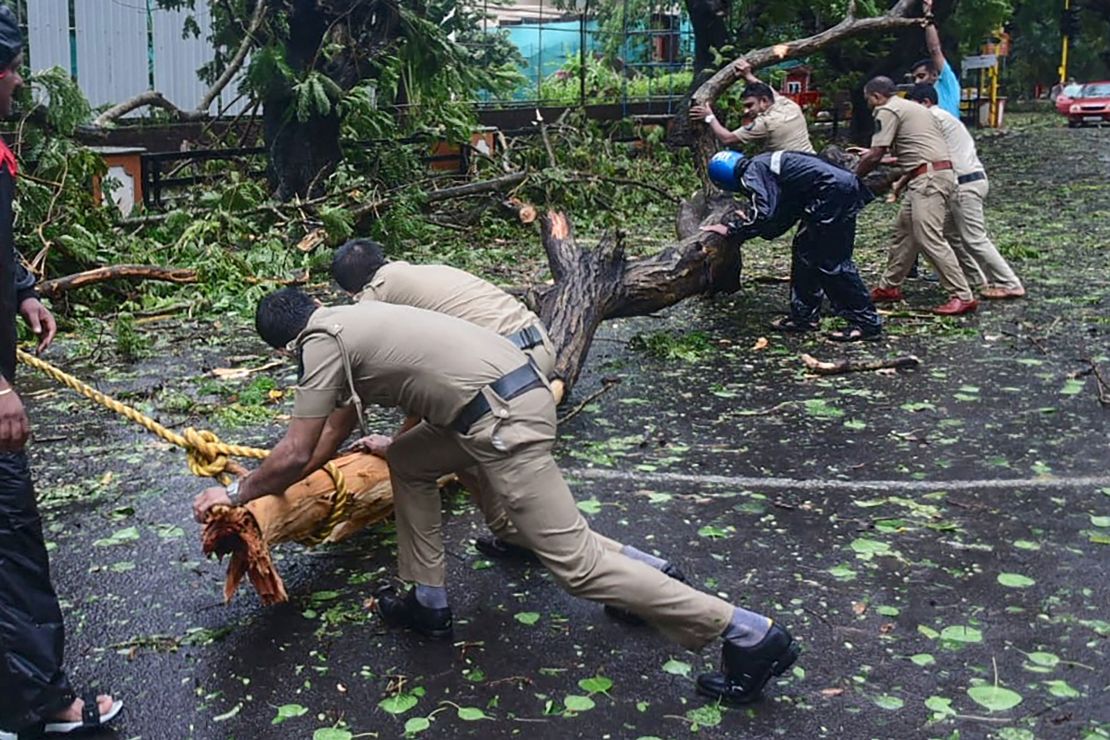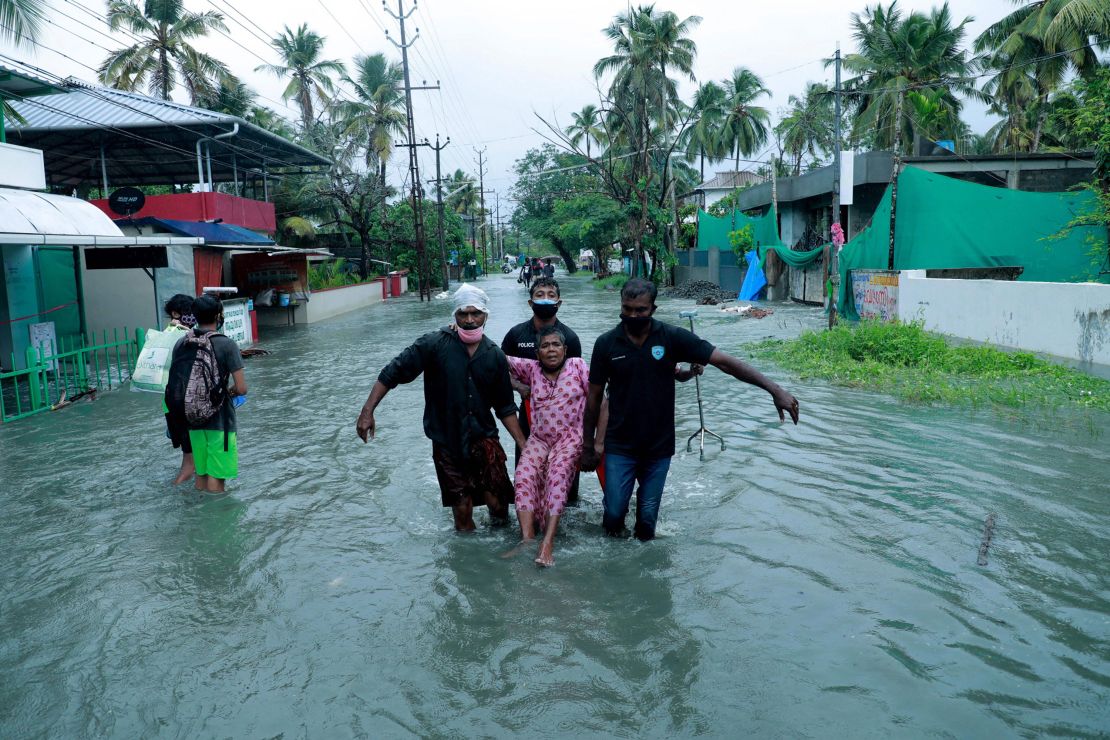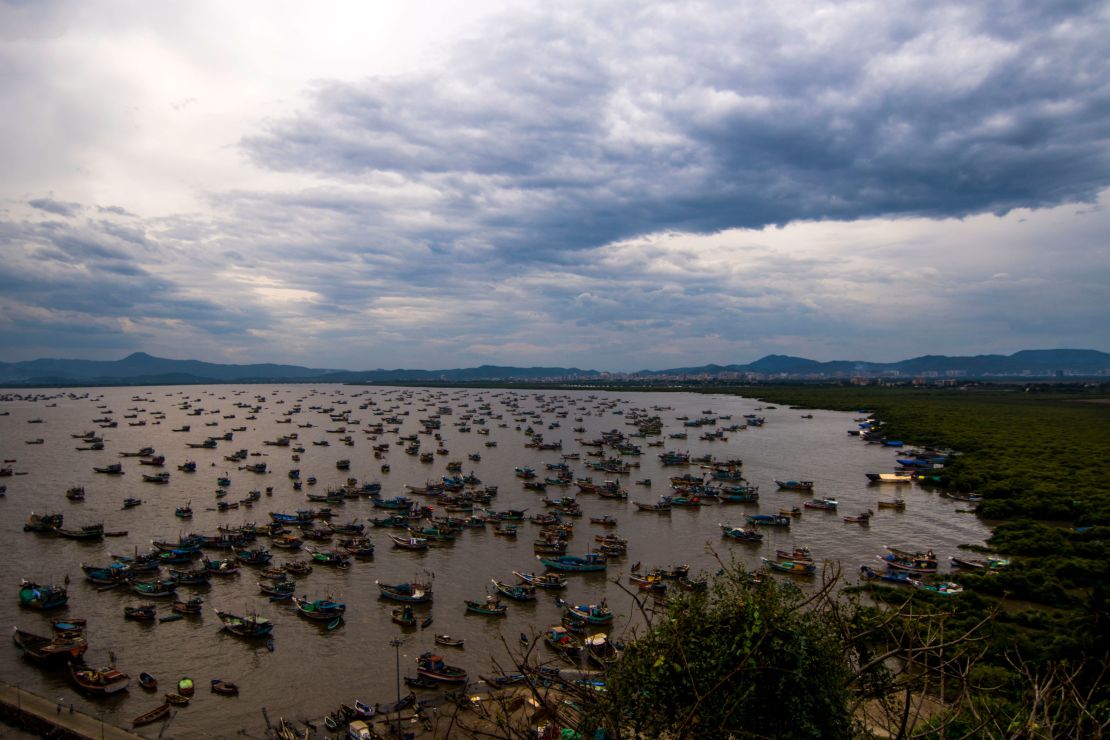Tens of thousands of people have been evacuated from low-lying areas in western India as a powerful cyclone is expected to make landfall Tuesday, threatening a region already struggling with a devastating second coronavirus wave.
Tropical Cyclone Tauktae, which formed in the Arabian Sea, is moving northward along India’s western coast, bringing damaging winds, heavy rain and the threat of storm surges to the state of Gujarat.
The storm is packing maximum sustained winds of 205 kilometers per hour (127 mph), according to the Joint Typhoon Warning Center. That’s equivalent to a strong Category 3 Atlantic hurricane and just shy of Category 4 strength, which begins at 209 kph (130 mph).
It’s the first named tropical cyclone of the year in the region, and a natural disaster like this couldn’t have come at a worse time as India is the global epicenter of the pandemic.
Tauktae has killed at least six people in southern Goa and Karnataka states.
At least two people died Sunday as a result of the storm, which caused heavy rainfall in Goa, the state’s chief minister Pramod Sawant said at a news conference.
“One boy died due to a tree falling on his head and the second death, two people were on a motorcycle when an electric pole fell on them and one died on the way to the hospital,” Sawant said.
In Karnataka, four people died, 216 houses were damaged and 253 people sought shelter in relief camps due to the cyclone as of Sunday evening, according to data from the Karnataka State Disaster Management Authority.

A rescue operation was conducted in Karnataka Monday, after two tug boats capsized Saturday with 10 people aboard. One body was recovered Saturday and the coast guard and navy rescued five people. The remaining four were stranded overnight but were airlifted by a navy helicopter, according to the coast guard on Monday.
Rescue and repair efforts are also underway in Kerala state, where several districts are on red alert for extremely heavy rainfall following strong winds and rain that damaged houses, downed trees, cut power lines and brought flooding as the cyclone moved northwest up the coast.
The Indian Meteorological Department (IMD) said Monday that Tauktae has intensified into an “extremely severe cyclonic storm.” As of 11 a.m. local time (1.30 a.m. ET), it was about 150 kilometers (93 miles) west of Mumbai and moving at a speed of approximately 15 kph (9 mph), the IMD said in its latest update. Landfall is expected on the Gujarat peninsula near the town of Diu around midnight on Tuesday local time.
Nearly 150,000 people are expected to be evacuated from villages and low-lying areas near the coast, and directions have been issued to complete the evacuation process by Sunday evening, the Gujarat government said in a statement, according to Reuters.
Rains over 200 millimeters (8 inches) have fallen in parts of India’s west coast and an additional 200 millimeters is possible in and around the Gujarat peninsula, according to CNN Weather. The threat to lives and property is likely to increase with storm surges expected between 1.5 and 3 meters (5 to 10 feet) in and around the landfall.
“It’s extremely rare for this time of year to have this cyclone, which is equivalent to a Category 3 hurricane, making its way into a landfall in India,” said CNN meteorologist Tom Sater. “It’s been coasting along the west coast of India, dropping an incredible amount of rainfall, flooding communities, (and causing) power outages.”
“If you head down to southern India, the town of Koch in Kerala – already over 500 millimeters of rainfall,” Sater added. “So communities have (already) been dealing with massive flooding, evacuations, downed trees, power outages. It’s a massive undertaking.”

India’s National Disaster Response Force (NDRF) said it has deployed more than 100 teams across six coastal states of Gujarat, Maharashtra, Goa, Kerala, Karnataka, and Tamil Nadu to help with evacuations and relief and rescue measures. Some 22 teams have been readied for back up, according to Satya Pradhan, director general of the NDRF.
“The main impact state will be Gujarat, and that’s where we expect maximum impact,” Pradhan said, adding that more than 50 teams had been deployed to that region alone.
In addition, the Indian Coast Guard and Navy have also deployed ships and helicopters for search and rescue operations.
The IMD has warned the strong winds are expected to destroy thatched houses along the coast in Diu and southern coastal areas of Gujarat. Major damage is expected to buildings and roads, overhead power lines and signaling systems, while floods will likely block escape routes and disrupt railways.
Covid vaccines suspended, patients evacuated
The cyclone comes as India battles a devastating second wave of Covid-19, with millions infected across the country in the past month and hospitals running out of oxygen and medicine. Thousands are dying every day.
Gujarat is seeing a high caseload of new infections, with more than 8,200 reported on Sunday, according to the state’s Health and Family Welfare Department.
Vaccinations have been suspended across Gujarat for Monday and Tuesday, and the state’s chief minister, Vijay Rupani, has asked officials to ensure electricity supplies to Covid-19 hospitals and other medical facilities are not disrupted and the supply of oxygen is maintained, the state government said, according to Reuters.
“The state government is completely ready to deal with the Tauktae cyclone,” Rupani said Monday. “People in 655 villages have been identified across 17 districts for evacuation. More than 100,000 people have been evacuated.”
Rupani urged Gujarat residents to “remain indoors considering the possibility of heavy rains along with cyclone in the state.”
In neighboring Maharashtra state, home to India’s financial capital and most populous city Mumbai, coastal districts have been put on a “state of high alert,” the chief minister’s office said on Twitter.
In Mumbai, 580 Covid patients from “jumbo centers” – the city’s makeshift coronavirus care centers – were shifted to various hospitals ahead of the storm on Friday and Saturday, a statement from the city’s municipal corporation said.

The state government said it has also “taken adequate precautions to ensure continuous electricity and oxygen supply to hospitals.”
During the 2020 cyclone season, Indian authorities mounted multiple ambitious evacuation operations even as the virus complicated the emergency response. Relief teams grappled with how to get people to safety while also protecting them against the risk of Covid-19.
On Saturday, Indian Prime Minister Narendra Modi directed senior officials to “ensure special preparedness on Covid management in hospitals, vaccine cold chain and other medical facilities on power back up and storage of essential medicines and to plan for unhindered movement of oxygen tankers,” according to a statement.
After making landfall, the cyclone is expected to lose some of its wind strength, CNN meteorologist Sater said. But heavy rainfall is still expected to continue to move into the high terrain of northern India.
CNN’s Gene Norman, Swati Gupta, Akanksha Sharma, Manveena Suri and Derek Van Dam contributed reporting.





